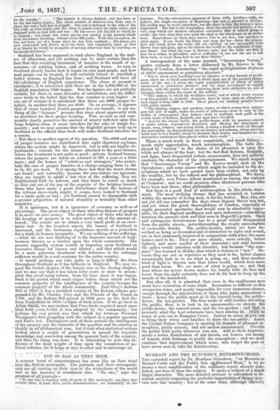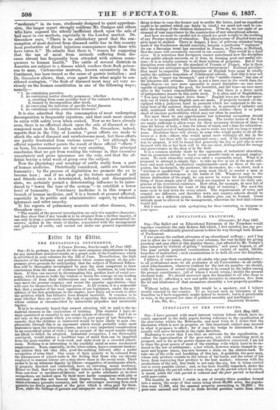MURRAIN AND THE BUTCHER'S METEMPSYCHOSIS. TILE extended report by Dr.
Headlam Greenhow, "on Murrain in Horned Cattle and the Public Sale oftoDiseitaed Meat," is by no means a mere amplification of the summary report already published, nor does it close the subject. It opens a subject of a much larger character. The more detailed account is calculated to diminish anxiety respecting the probableimportatian of Steppe murrain into this counti7; but at the same tune, although officially
"moderate" in its tone studiously designed to quiet apprehen sion, the larger report tone, confirms Mr. Gamgee and others who have exposed the utterly inefficient check upon the sale of
bad meat in our markets, especially in the London market. Dr. Greenhow says, "There is no satisfactory proof that the con
sumption of meat derived from diseased cattle has in this country
been productive of direct injurious consequences upon those who have eaten it." He admits that there is "reason for supposing
that the use of meat from animals suffering from dis eases abroad has frequently been attended with serious consequences to human health." The cattle of several districts in
America are subject to a disease which renders their flesh poison ous to man. Carbuncular murrain, known extensively on the Continent, has been traced as the cause of gastric irritation ; and Dr. Greenhow allows, that, even apart from what might be considered contagion, "the flesh of diseased meat may act very seriously on the human constitution in one of the following ways ; namely- " 1. As containing parasites. 2. As containing matter directly. poisonous; whether a, resulting from some peculiar food of the smimala during life, or
b, formed by decomposition after death. 3. As conveying the infection of specific brutal diseases. 4. As containing certain putrefactive ferments."
It is also admitted that the consumption of meat undergoing decomposition is frequently injurious, and that such meat cannot be eaten with safety even when cooked. Now as we have already seen, there is no effectual check upon the sale of diseased or decomposed meat in the London market. Dr. Green.b.ow, indeed, reports that in the City of London "great efforts are made to
check the sale of diseased and unwholesome meat, but these efforts are .partly frustrated from various causes " ; but although the
official reporter rather paints the result of these official "efforts " en beau, his reassurances are not very assuring. The principal conclusion that we get from reading his volume is, that excessive uncertainty and gross ignorance are the rule and that the officials betray a total want of grasp over the subject. Now the physiology and nosology of cattle really form a part of human medicine. Dietetically considered, cattle are inchoate humanity ; by the process of deglutition we promote the ox to become man ; and if we adopt as the future material of self and friends oxen in a deteriorated, infected, and disorganized state, we certainly permit a deteriorating influence to be introduced to "lower the tone of the system "—to establish a lower level of humanity. Veterinary medicine is in this respect a branch of human medicine, and it is a branch at present affected, especially in its public and administrative aspect, by wholesale ignorance and. utter anarchy.
It his reports of pulmonary murrain and other diseases, Dr. Greenhow says— "The results of the present investigation are onlyrif a negative character ; but they show that if any benefit is to be obtained from a further inquiry, it
can only be from a systematic investigation of the disease by professional observers, skilled in the study of disease, acquainted with the management and pathology of cattle, and carried out under one general superintendence.'



























 Previous page
Previous page